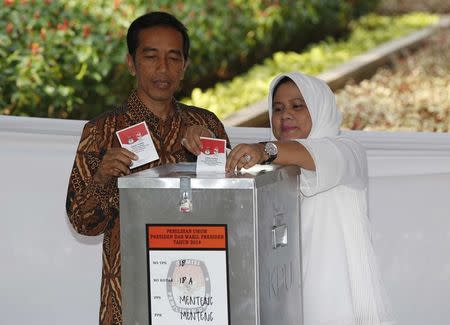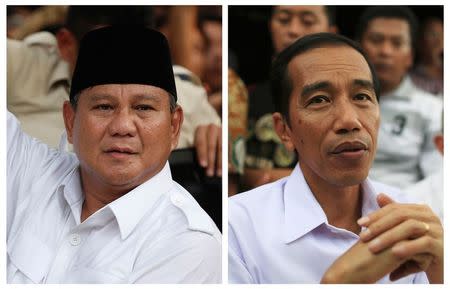Indonesians vote for new president, choice between old guard and new breed
By Michael Taylor and Nilufar Rizki JAKARTA (Reuters) - Indonesians voted on Wednesday in a presidential election that has turned into a closely fought contest between the old guard who flourished under decades of autocratic rule and a new breed of politician that has emerged in the fledgling democracy. Only the third direct election for president in the world's fourth-most populous nation, the contest pits former general Prabowo Subianto against Jakarta Governor Joko "Jokowi" Widodo, who have been running neck-and-neck in opinion polls. "This is a good day for the Indonesian nation and the Indonesian people. I’m very confident," media quoted Jokowi as saying when he cast his vote in the capital, wearing a traditional batik print shirt and accompanied by his wife. His rival Prabowo, wearing a white safari shirt and the national black "peci" hat and looking equally confident, said: "We respect the democratic process and, of course, we should conduct a good and correct process and show respect." With the race too close too call, there have been concerns of violence once the result is known, a worry alluded to by outgoing President Susilo Bambang Yudhoyono when he urged both sides to accept the result. Private quick counts, which have been reliable in the past, are expected to give a result by early evening. The official result will be announced about two weeks later. It has been the dirtiest and most confrontational campaign in memory in a country which traditionally holds up the value of consensus politics. Voting began in distant eastern islands and will finish two time zones away in the densely populated western islands at 0600 GMT. There were no early reports of violence. The government declared Wednesday a public holiday and markets were closed. Normally congested streets in Jakarta were mostly empty and polling stations across the archipelago seemed to be coping well with a steady stream of voters. "This is one of the most important elections in Indonesia's reformation history," Bernard Wanandi, 37, said at a polling station in Menteng, a Jakarta suburb. "As a young generation, we have high expectations of the new leader, hoping he will bring the country forward and change the country tremendously." There has been growing frustration over the way the world's third largest democracy has been governed with corruption rampant and economic growth slowing. DIFFERENT PERSONALITIES It is a sentiment both candidates have addressed in their campaigns, though they offer starkly different personalities. Jokowi, 53 and born into poverty, has stormed his way to the top rungs of leadership with a clean image and a reputation for competence in local government, a reversal of the autocracy, corruption and power politics that have weighed down Southeast Asia's biggest economy for decades. Considered Indonesia's most popular politician, his once insurmountable lead in opinion polls has all but disappeared in recent weeks in the face of smear campaigns and expensive and intensely focused electioneering by Prabowo. Prabowo, 62, is running on promise of strong, tough leadership, playing up his military past and invoking memories of Indonesia's post-colonial and fiercely nationalist first president Sukarno, who ruled from 1945-67. Prabowo's high-profile military career, during which he rose speedily through the ranks, unravelled quickly after the 1998 fall of long-serving autocrat Suharto, his former father-in-law. "I just voted for Prabowo because I've been promised by his party they will pay for my children's education. I personally like him because he is the former son-in-law of Suharto," said housewife Titi Rahayati, 49, in the West Java city of Tasikmalaya. West Java, the most populous province with a fifth of the total vote, could decide the presidential race. It is home to a highly conservative brand of Islam and is the country's second largest rice producer. Polls ahead of the election showed that Prabowo, who has the backing of three major Islamic-based parties, leads in the province. Prabowo was discharged from the army for breaking the chain of command and ordering troops to arrest activists. He was never investigated on any criminal charge and has consistently denied wrongdoing. The election will mark the first time a directly elected president hands over the reins to another in the world's most populous Muslim nation. Outgoing President Yudhoyono, who has largely disappointed in recent years, must step down in October after serving two terms. The election commission expects a high turnout. Of 190 million eligible voters, around 11 percent will be punching the ballot for the first time. Close to a third are under 30. A Prabowo win is expected to weaken markets due to concerns he will introduce protectionist policies in the financial and farm sectors, and launch big debt-funded spending projects. "I hope the new leader will be better than the past and doesn't make empty promises," said Nunu, 54, in Menteng. "In the past they never fulfilled any promises." (Additional reporting by Randy Fabi, Benny Louis Siahaya, Gayatri Suroyo, Adriana Nina Kusuma and Dennys Kapa in Jakarta, and Lewa Pardomuan in Tasikmalaya, Editing by Jonathan Thatcher and Ron Popeski)



